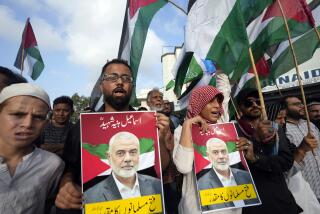U.S. won’t say who killed militant
- Share via
WASHINGTON — The top U.S. military officer on Friday described the airstrike that killed a leading Al Qaeda commander in Pakistan as an important victory, but he refused to say whether the U.S. government had anything to do with it.
“The strike was a very important one, it was a very lethal one,” Navy Adm. Michael G. Mullen, chairman of the Joint Chiefs of Staff, said at a Pentagon news conference. He brushed aside questions about any role the Pentagon may have played.
The CIA and the Pakistani government also refused to say who might have fired the missile or missiles that are believed to have killed Abu Laith al Libi and perhaps other Al Qaeda leaders in a small compound in northwest Pakistan this week.
The U.S. government’s reluctance to take public credit for the killing of Al Libi underscores the growing tensions between the United States and Pakistan over how to attack Al Qaeda as it entrenches itself on Pakistani territory, current and former U.S. officials and other experts said.
The government in Islamabad won’t allow U.S. forces onto its soil to conduct counter-terrorism missions, so Washington has resorted to airstrikes launched from across the border in Afghanistan. But despite the occasional success, few in the counter-terrorism community believe that airstrikes are enough, and some have been openly pressing for more access.
In recent weeks, Director of National Intelligence J. Michael McConnell and CIA Director Michael V. Hayden made a trip to Pakistan to press for more cooperation from military and intelligence officials there. And Friday, Mullen said he too would be traveling to Islamabad this month to meet with Pakistani leaders, including the army chief, Gen. Ashfaq Kiani.
“While this particular strike was very successful, and we were very pleased with the outcome, there is still a great deal more work to do,” Mullen said.
He said the U.S. remained “concerned about the safe havens” in the tribal areas near the Afghan border, a concern heightened by an increase in Al Qaeda and Taliban violence against targets in Pakistan in recent months.
“Being able to have an impact in a safe haven, I think, is an important one,” Mullen said. “We’re very committed to working with the Pakistanis on this.”
He acknowledged that the United States was essentially powerless to do anything within Pakistan without the government’s cooperation. He said he hoped to establish a personal relationship with Kiani and the rest of the Pakistani leadership and to “make sure that I understand his concerns and in fact work very hard to support them. . . . We will only do what is requested by Pakistan.”
President Pervez Musharraf has maintained that Pakistani forces are capable of defeating Al Qaeda, the Taliban and other militants in the tribal areas. He has remained silent on Al Libi’s death, which was announced this week on some Al Qaeda-affiliated websites.
Local officials had said about 12 people were killed in the strike late Monday or early Tuesday, most of them “foreigners” -- Arabs and Central Asians not from the area -- which fits the profile of Al Qaeda fighters in the tribal areas.
Residents had reported a missile strike on the small compound just outside the town of Mir Ali, which is considered a militant stronghold. Witnesses said they heard what they believed were Predator drones flying in the area shortly before the compound was hit.
Two Predator airstrikes were launched at suspected Al Qaeda targets, including Ayman Zawahiri, the network’s second in command, in the tribal areas in 2006, but both appeared to be unsuccessful. One of them, on Jan. 13, 2006, in Damadola, sparked outrage among Pakistanis because at least 13 civilians were killed, prompting a sharp rebuke from Musharraf.
On Friday, some current and former U.S. counter-terrorism officials said Predator strikes would have little impact on Al Qaeda, especially given its increasingly strong connections to the Taliban and to tribal groups that also appear to be throwing in their lot with Osama bin Laden, or at least protecting his network out of loyalty or in return for financial compensation.
Bruce Riedel, a veteran Pakistan expert formerly with the CIA, State Department and National Security Council, said the silence surrounding who was behind the airstrike was designed to hide the fact that the U.S. was being forced to fight Al Qaeda at a distance without the full support of the Pakistani government.
“That no one seems to be responsible shows just how delicate and fragile our relationship . . . with Pakistan is,” Riedel said. He said the situation in Pakistan had deteriorated significantly in recent months, and that the U.S. has grown more concerned with the spread of Taliban militants, especially since the assassination of former Pakistani Prime Minister Benazir Bhutto and given the Musharraf government’s preoccupation with winning parliamentary elections this month.
“We are now seeing a huge Al Qaeda and Taliban presence in Pakistan, and a Pakistan government that is not capable of dealing with it itself, and is reeling because of its own domestic political problems, and we have to resort to fighting it indirectly through unacknowledged Predator strikes. That is far from an optimal way of going about it,” said Riedel, a senior fellow at the Brookings Institution, a centrist Washington think tank.
Lisa Curtis, who was a Pakistan expert at the CIA, the State Department and as a professional staff member of the Senate Foreign Relations Committee, said the silence on who launched this week’s attack was understandable given that a large percentage of Pakistanis have said they oppose their government’s cooperation with the United States on counter-terrorism.
“The reason the United States and the Pakistanis don’t talk openly about the details is because there is a possibility of a backlash among the general population, parts of which have sympathies with the Taliban,” said Curtis, a senior research fellow on South Asia issues at the conservative Heritage Foundation think tank.
“We have to assume that there is more cooperation than Musharraf wants to discuss publicly. The Pakistanis generally want to resolve the extremist problem in other ways beyond just military operations,” Curtis said, adding that Washington was cooperating with Islamabad on some of these efforts.
--
More to Read
Sign up for Essential California
The most important California stories and recommendations in your inbox every morning.
You may occasionally receive promotional content from the Los Angeles Times.










